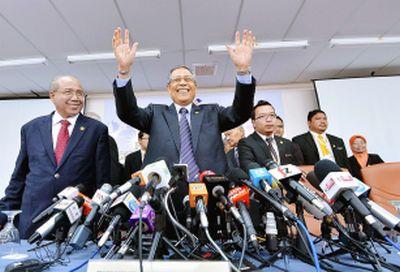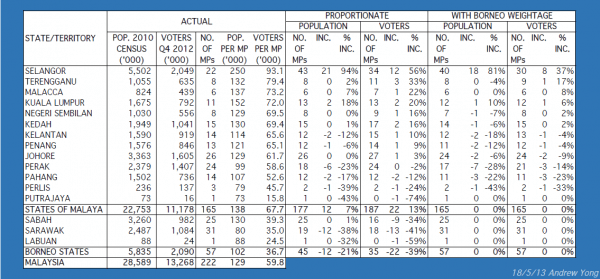Andrew Yong provides a solution for Malaysia’s gerrymandering problem.
Having read “A Brief History of Malapportionment: How BN Can Win 59.9% of the Seats with 47.4% of the Vote“, some people have asked “What do we do next?” There are several things that can be done to address malapportionment; some are things we each can do in any case, whereas some require cross-party agreement to amend the Constitution.
Amending the Constitution
If there were cross-party consensus — unlikely as it may be — the Constitution could be amended in several ways to correct malapportionment in Malaysia:
First, to restore the original Merdeka Constitution provision whereby seats are divided between the States of Malaya based on the number of registered voters in each State, having regard also to the population of each State. Under such a system, the number of MPs allocated to Selangor would increase to between 30 and 40 MPs
(As for the Borneo States and the Federal Territories, Sabah and Sarawak should each continue to have the extra representation guaranteed in the Malaysia Agreement 1963. It is also unavoidable that each Federal Territory, no matter how small, be given at least one MP);
Table showing actual allocation of MPs by population and number of voters, compared with (a) a purely proportional allocation, and (b) an allocation that preserves the additional representation given to the Borneo States with a minimum of one MP each for Labuan and Putrajaya.
Second, to restore the original Merdeka Constitution provision whereby each seat cannot be 15% larger or smaller than the average in the same State;
Third, to restore the original Merdeka Constitution provision whereby the EC is empowered to conduct constituency redelineation independently without interference from the Prime Minister or the Dewan Rakyat; and
Fourth, and more radically, to create a new class of non-constituency “top-up” seats which are allocated to political parties who score at least 5% of the national vote, to make their share of the seats as close as possible to their share of the popular vote. This is the system known as Mixed-Member Proportional Representation, which has been adopted in Germany, New Zealand and various other countries.
Without Amending the Constitution
If the Constitution is not amended, then the number of seats allocated to each State and Federal Territory will remain unchanged. However, there are still a number of things that Malaysians can try to do when the next constituency redelineation is carried out by the EC, beginning at the end of this year.
Contrary to popular belief, as long as the number of seats in each State remains the same, the redelineation of both Federal and State constituency boundaries is subject only to the approval of a simple majority of the Dewan Rakyat. However, if the number of parliamentary or State seats in any State is to be changed, then a two-thirds majority is required to amend the Federal or State Constitution (as the case may be).
The Thirteenth Schedule to the Constitution provides the basis on which seats are to be delineated within each State. Of particular relevance are the principles that:
(c) the number of electors within each constituency in a State ought to be approximately equal except that, having regard to the greater difficulty of reaching electors in the country districts and the other disadvantages facing rural constituencies, a measure of weightage for area ought to be given to such constituencies;
(d) regard ought to be had to the inconveniences attendant on alterations of constituencies, and to the maintenance of local ties.
Principle (c) requires the EC to deviate from “approximately equal” constituencies by applying a “measure of weightage for area”. This rural weightage was capped at +/- 15% (i.e. +35% ) in 1957, but was increased to +100% in 1962. Since 1973, there has been no fixed cap on the rural weightage, but the “measure of weightage for area” should arguably be a single formula, rational, based on land area, and consistently applied across Malaysia. In particular, there should not be a gross discrepancy between two urban seats or two rural seats of the same land area within the same State. The EC must be forced to disclose and to justify the precise formula that is used to calculate the rural weightage in Malaysia, and any excessive weightage beyond +100% should be vigorously contested.
Principle (d) requires the EC to lean on the side of not altering constituency boundaries where possible. This inclination is mirrored in the procedural provisions of the Thirteenth Schedule. If no boundary alteration is proposed, then the EC does not have to consult the public on retaining the existing boundaries. However, if the EC proposes to make any changes, then it must advertise the changes publicly and allow one month for representations. If a State Government, local authority or 100 or more voters in the constituency submit objections, then the EC is required to hold a local enquiry on the proposed alterations. If any further changes are made, then a second local enquiry can be compelled.
Where it has a two-thirds majority in the State Legislative Assembly, a State Government can also force the EC to make limited changes to State (and, indirectly, parliamentary) constituency boundaries by amending the State Constitution to increase or decrease the number of seats in the State Legislative Assembly. However, it is ultimately up to the EC to decide where the new State constituency or constituencies should be located, and how the Federal constituencies should be altered as a result. Whether or not this step is advisable will depend on local circumstances.
Once the redelineation is complete, any proposed changes are laid before the Dewan Rakyat. If the Dewan Rakyat rejects the proposed changes, then the Prime Minister himself can make changes to the redelineation after consulting with the EC, before it is resubmitted it for approval! In so doing, the Prime Minister is not required to consult with members of the public, but he can and should expect the closest public and media scrutiny.
The EC must be under no illusions that the forthcoming redelineation of constituency boundaries will not be closely scrutinised by citizens at every level and at every stage of the process. If the redelineation does not comply with any of the provisions of the Constitution, then we must challenge it in Court. In the meanwhile, we, the voters of Malaysia, must place every form of political pressure imaginable on the Federal Government and Members of Parliament to press for a fairer and more representative redelineation, which must be one of the key demands of any Bersih 4.0 rally.



The information you have to say this is very useful
Restoring the original merdeka constitution is a good start all round.
MMP OR WHATEVER. UNLESS EC IS REPORTING TO PARLIAMENT, THE GOVT. IN POWER NOW WILL KEEP ON CHEATING AND ENSURE THEY WILL BE IN POWER FOR A LONG LONG TIME.
WHAT CAN WE DO ABOUT IT?
THOSE MEMBERS OF PARLIAMENT MUST ENSURE THEY KEEP ON HARPING ON THE SAME ISSUE ON GETTING EC TO BE ANSWERABLE TO PARLIAMENT. NO POINT TALKING OTHER TOPICS IF THIS 'MOST AND ONLY IMPORTANT' MATTER IS NOT SOLVED.
TALK IS RUBBISH IN PARLIAMENT THOUGH !
What can we expect from the present EC but to re-delineate to the advantage of the incumbent Govt?
The only surprise and shock will come if the re-delineation is going to be fair. I am hoping to be shocked but I am not holding my breath.
Restoring the original merdeka constitution is a good start all round.
Gareth – I agree with most of what you say.
The benefit of MMP is that it removes in one fell swoop (depending on the number of top-up MPs) the incentive to malapportion and/or gerrymander. We could then retain a 1:2 or even 1:4 rural weightage that is arguably necessary in places like rural Sarawak – Hulu Rajang parliamentary constituency (18,000 voters, 32,000 sq km) is almost as large as the largest State in Malaya – without affecting the overall result.
The Dewan Negara is another subject, and one that can easily be resolved by a simple Act of Parliament under Article 45(4) to increase the number of Senators for each State to three each (=39 in total), to make them directly elected, and to abolish the appointed Senators (possibly keeping the 4 for the Federal Territories).
All good suggestions. I am doubtful about the usefulness of MMP or any mixed-member system. The main improvement to the system would be to deal with the malapportionment. Perhaps there should also be a statutory commitment to constituencies of a logical and reasonable shape, as an anti-gerrymandering safeguard. Yet the major problem with the electoral system is malapportionment rather than gerrymandering, as the former is easier to do, and a less risky method of loading the dice.
Nothing is said here about the Dewan Negara. It should play an important revising role on government legislation. As the original constitution and its name imply, it was to provide an equal voice to the states. Since then its composition has been altered so that it is packed with government appointees. This totally undermines the role of Dewan Negara as a reasonable counterbalance to prime-ministerial power.